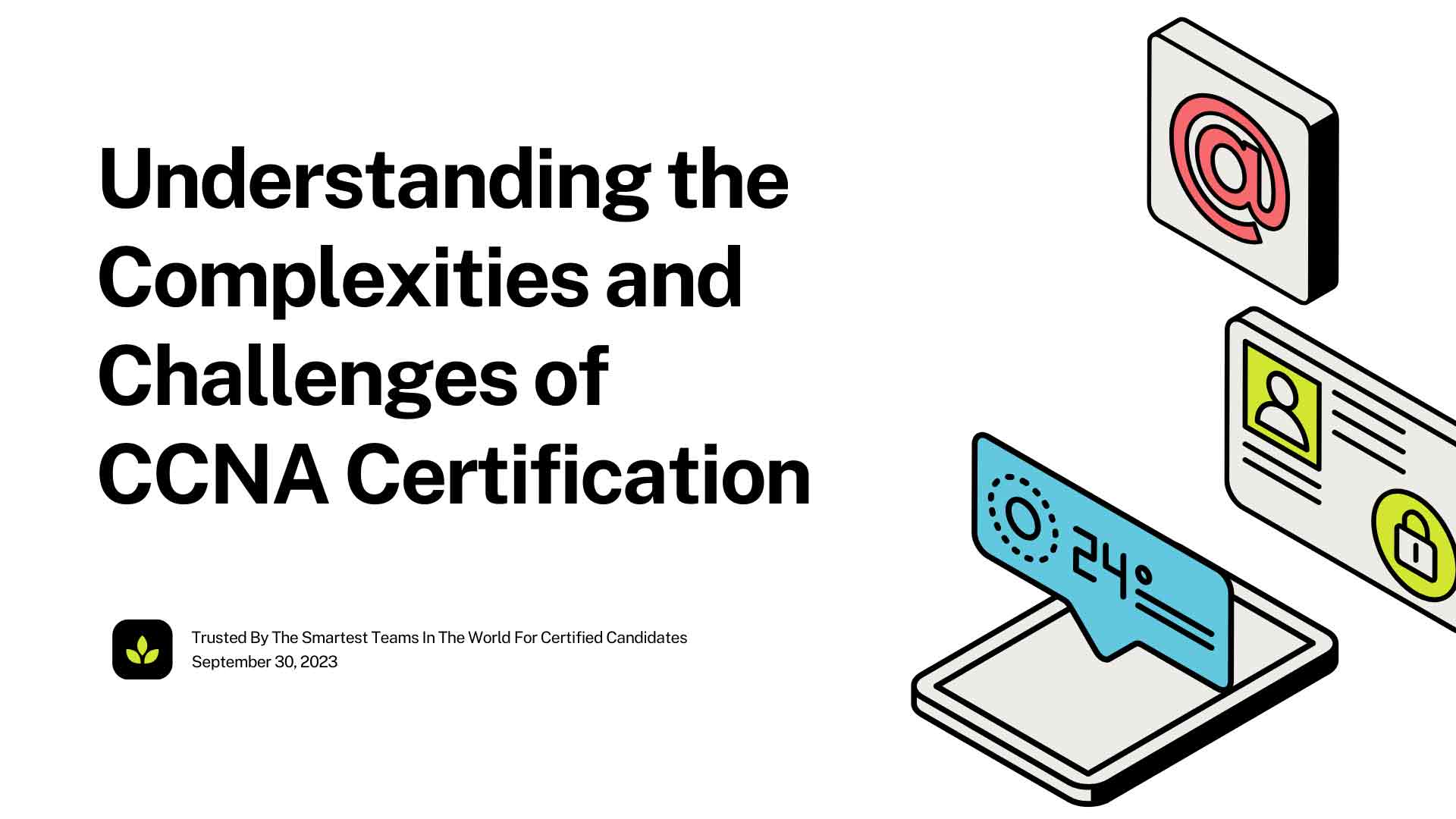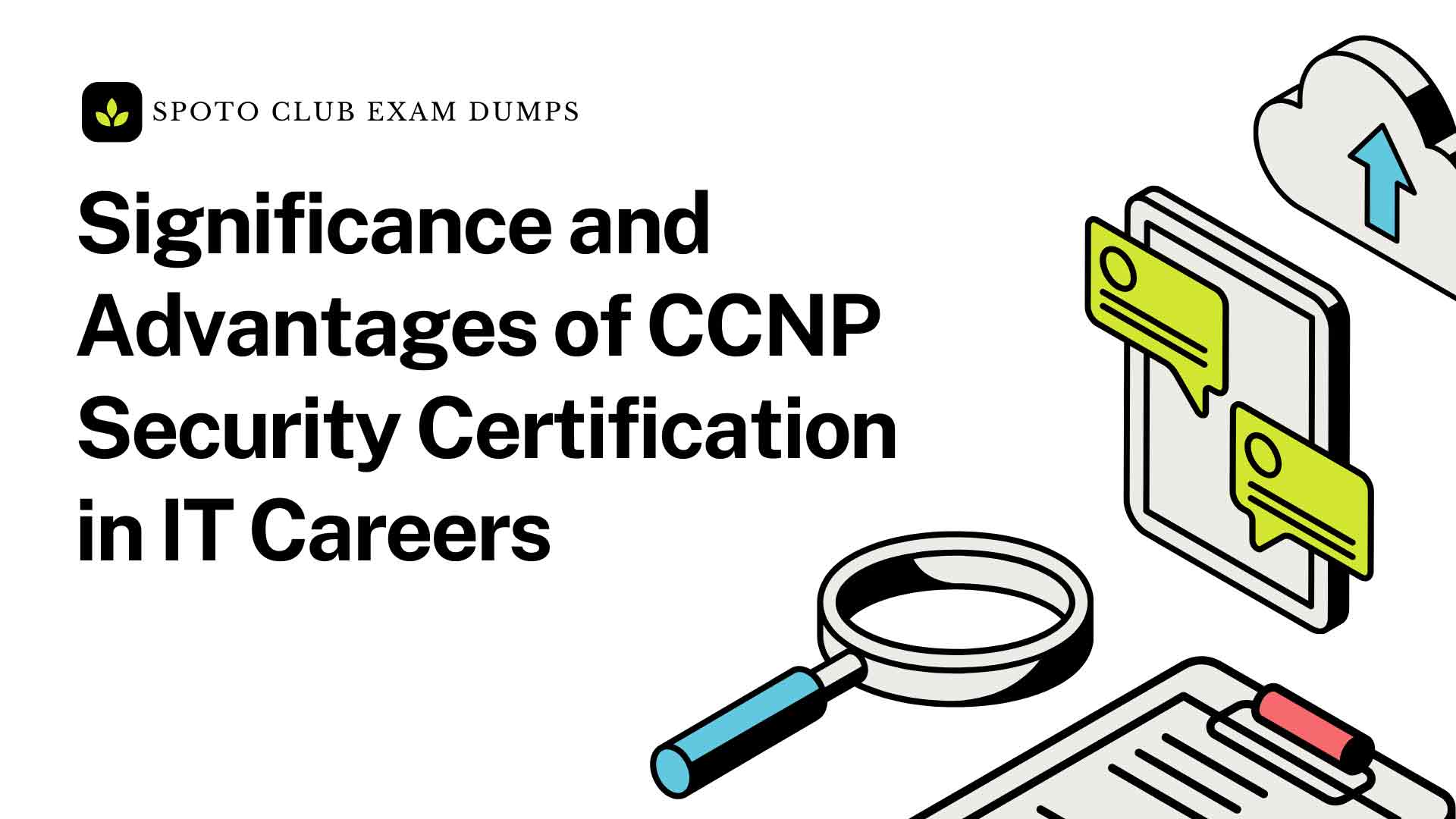-
- CCNA
- 330
- 2024-01-17
I. Exploring CCNA Cybersecurity Operations
In our digitally-driven era, the significance of cybersecurity is more pronounced than ever, given the surge in cyber threats. The Cisco Certified Network Associate (CCNA) Cybersecurity Operations program is pivotal in preparing today's cybersecurity enthusiasts and professionals.
A. Overview of the CCNA Cybersecurity Operations Curriculum
The CCNA Cybersecurity Operations course offers an in-depth exploration of key cybersecurity concepts. It delves into various threats and protective strategies, playing a crucial role in the cybersecurity realm.
1. The Necessity of Recognizing Threats and Security Strategies
Mastering common threats and defensive measures is essential in the ever-changing cyber environment. The CCNA curriculum focuses intensely on these areas, preparing individuals to identify, comprehend, and counteract cyber threats.
2. The Value of Practical Virtual Lab Experiences
In a field as intricate as cybersecurity, hands-on experience is irreplaceable. The CCNA Cyber Ops curriculum emphasizes practical virtual labs, allowing learners to deeply understand cyber threats and effective countermeasures.
B. Real-World Applications
While theoretical knowledge in cybersecurity is vital, its real-world application is what truly matters. The CCNA Cybersecurity Operations course provides insights into the workings of a Security Operations Center (SOC).
1. Functioning within a Security Operations Center (SOC)
Understanding SOC operations broadens a cybersecurity professional's perspective, enabling effective responses to various issues. Trained CCNA cybersecurity operators become invaluable in SOCs, adeptly managing and mitigating cyber threats.
II. Cisco Certified Support Technician (CCST) Prospects
A. The Role of CCST in Cybersecurity
1. Core Skills from CCST Training
The CCST program equips participants with essential security knowledge. Trainees learn about public key infrastructure, device security, and perimeter defenses, preparing them for cybersecurity challenges in the digital age.
B. Benefits of CCST Certification
1. Enhanced Employment Opportunities
Having a CCST certification often leads to better job opportunities in cybersecurity. Recognized globally, it opens doors to roles like network security analyst or engineer.
2. Comprehensive Coverage of Cybersecurity Topics
The CCST certification delves into the complex cybersecurity landscape, covering vital topics like vulnerability management, incident response, and data integrity.
III. CCNA's Role in Cybersecurity
A. Practical Skills from CCNA Certification
1. Implementing Firewalls and Secure Access
The CCNA certification equips individuals with the skills to apply crucial cybersecurity measures, including firewalls and secure access, key in defending against cyber threats.
2. Setting Up and Managing VPNs
CCNA emphasizes the setup and management of VPNs, enabling secure connections over the internet and safe data exchanges.
IV. Comparing CompTIA Security+ with Cisco CCNA
A. An In-depth Look at CompTIA Security+
1. Why CompTIA Security+ is Ideal for Beginners
CompTIA Security+ is globally acknowledged as a foundational certification, covering essential cybersecurity topics. It serves as a starting point for those entering the field.
2. Minimal Preparation for Aspirants
Another advantage of CompTIA Security+ is its low barrier to entry, requiring minimal preparation and no prerequisites, attracting newcomers to cybersecurity.
B. Contrasting and Comparing the Two Certifications
1. Relative Value of Each Certification
The CCNA certification offers a mix of theoretical knowledge and practical skills, ideal for those seeking detailed understanding of specific cybersecurity systems. CompTIA Security+, on the other hand, provides a foundational grasp of cybersecurity principles, making it suitable for beginners.
CompTIA Security+, on the other hand, provides a foundational grasp of cybersecurity principles, making it suitable for beginners.
2. Tailoring Certification to Career Goals
The decision between CCNA and CompTIA Security+ should align with a candidate's career ambitions. Those aiming to specialize in network security may find CCNA more beneficial due to its focus on Cisco's network solutions. In contrast, individuals new to the field may prefer CompTIA Security+ for its broad approach.
In conclusion, both CCNA and CompTIA Security+ certifications offer unique advantages for cybersecurity professionals. Whether starting out or looking to deepen specific knowledge, these programs provide valuable skills and insights for navigating the complex world of cybersecurity.
-
- Cisco
- 337
- 2024-01-18
I. The Critical Role of CCNA Certification in Networking Careers
A. Elevating IT Career Prospects with CCNA
In the rapidly evolving IT sector, possessing a CCNA certification can significantly enhance career prospects. Recognized worldwide, the CCNA credential sets certified individuals apart, offering them a competitive edge. This certification paves the way for roles such as Network Engineer and Network Administrator, offering not just employment but rewarding and meaningful career opportunities. In the progressive realm of IT, a CCNA certification can lead to continuous growth, new challenges, and diverse opportunities.
II. Career Possibilities with a CCNA Certification
B. CCNA's Impact on Networking Career Roles
Holding a CCNA certification is often a key requirement for network-centric jobs like Network Engineer or Network Administrator. It's a testament to an individual's adeptness in network management, configuration, and troubleshooting.
III. CCNA Certification: A Business Game-Changer
B. High Market Demand for CCNA Professionals
The expertise of CCNA certified professionals is increasingly sought after in the market. Businesses recognize their ability to maintain and optimize network infrastructures, a critical factor in seamless business operations.
IV. Networking Career Advancement with CCNA Certification
B. CCNA Certification: A Step Towards Professional Growth
Opting for CCNA certification is a strategic move towards professional advancement. It not only opens up career opportunities but also increases earning potential and broadens networking knowledge and skills.
C. Broad Spectrum of Job Opportunities with CCNA
A CCNA certification can significantly diversify one's career options. It provides access to various roles in both small IT firms and large multinational corporations, depending on individual skills and employer requirements.
V. The Empowering Impact of CCNA Training
B. Preparing for a Flourishing Networking Career with CCNA Training
Comprehensive CCNA training prepares individuals for the complexities of networking. It introduces them to relevant hardware and software, deepens their understanding of networking concepts, and hones their abilities in designing and implementing network systems, setting them on the path to a prosperous networking career.
In conclusion, the Cisco Certified Network Associate (CCNA) certification is a crucial enabler in the world of networking and IT. It not only validates technical skills and knowledge but also serves as a gateway to a multitude of career opportunities and advancements in the ever-evolving field of information technology.
-
- CCNA
- 353
- 2024-01-18
I. Financial Considerations in IT Certification Pursuits
Gaining IT certifications is a key ambition for many aspiring IT professionals, seen as a path to career enhancement and increased earnings. However, the financial aspect of these certifications varies, influenced by the course depth and the standing of the issuing body.
A. Analyzing the Costs Associated with IT Certifications
Costs tied to IT certifications go beyond the price of the exam. Expenses such as training fees, study materials, fees for rescheduling or renewing certifications, and in some cases, travel expenditures for onsite exams, all contribute to the total cost. This includes expenses for official textbooks, study guides, additional learning materials, and practice tests.
B. Factors That Affect IT Certification Costs
The price of IT certifications is impacted by several elements, such as the certification level (beginner, intermediate, expert), its industry recognition, the certifying organization, and the market demand for the certification. Other significant factors include the exam fee, potential costs for re-examination, the expense of study resources, inflation, and fees for certification renewal.
C. A Look at CCNA Certification Expenses
For instance, the Cisco Certified Network Associate (CCNA) examination fee stands at about $300, as reported by CBT Nuggets. Candidates should also plan for additional expenses related to study materials and training, which are integral parts of the overall cost of achieving CCNA certification.
II. In-Depth Analysis of the CCNA Exam
A. Breakdown of the CCNA Exam Fee
The CCNA exam, aimed at validating networking skills of IT professionals, has an estimated cost of $300. Nevertheless, the total cost for obtaining this certification encompasses more than the exam fee, including costs for training resources, practice exams, and the possibility of re-taking the exam.
B. Importance of Comprehensive Preparation for the CCNA Exam
Meticulous preparation for the CCNA exam is crucial to mitigate the need for additional exam attempts. Investment in high-quality study resources and training courses is essential to increase the likelihood of passing the exam on the first try, thereby saving both time and money.
III. Evaluating the Worth of CCNA Certification
A. Advantages and Challenges of the CCNA Credential
The CCNA certification offers substantial benefits including enhanced remuneration and a competitive advantage in the IT job market. However, the $300 exam fee and the certification's technical depth may pose challenges for some candidates. The extensive syllabus may also be intimidating for those new to the field.
B. Assessing the Return on Investment for CCNA
Although initially costly, the potential long-term returns from a CCNA certification are significant. It can open doors to improved job prospects and elevated salaries. Successfully passing the exam on the first try also reduces the overall investment, enhancing the value of the certification.
C. Real-World Benefits of Earning a CCNA Certificate
Holding a CCNA certification extends beyond mere salary increases. It certifies expertise in networking, boosts professional credibility, unlocks new career opportunities, offers global mobility, and fosters a community of like-minded professionals.
IV. Exploring Additional Cisco Training and Certifications
A. Overview of Other Cisco Certifications
Cisco provides a spectrum of certifications for both beginners and seasoned IT professionals. These range from the CCDA, focusing on network design, to the CCNP, targeting extensive network management, and the CCIE, a premier certification for managing complex network infrastructures.
B. Cost Comparison of Cisco Certifications
The pricing of Cisco certifications differs. For example, the CCNP requires two exams at $300 each, totaling $600, while the CCIE involves a written exam and a lab exam, costing a cumulative $2050, reflecting the advanced skillset required.
C. Aligning Cisco Certifications with Career Objectives
Choosing the right Cisco certification should be aligned with individual career goals and the current market demands. While the CCNA offers foundational knowledge, advancing to certifications like the CCNP or CCIE can lead to enhanced career opportunities and increased earning potential.
V. Strategies for Preparing and Excelling in IT Certification Exams
A. Effective Approaches for Success in CCNA and IT Exams
To succeed in CCNA and other IT certification exams, a comprehensive study strategy is crucial. This includes participating in study groups, practicing with simulations, and using the latest study guides. Keeping up with changes in exam formats is also vital for exam success.
B. The Role of Continuous Training in IT Certifications
Continuous learning and training are essential in the rapidly evolving IT field. Regular training and upskilling through IT certifications are crucial for staying relevant in the industry, leading to advanced qualifications and improved job opportunities.
C. Leveraging Official Cisco Training for Exam Preparation
Official Cisco training courses are key to effective exam preparation. These courses offer a thorough understanding of exam content through expert-led instruction, practical experience with Cisco systems, and access to extensive study materials, significantly enhancing chances of exam success.
-
- CCNA
- 312
- 2024-01-18
I. Salary Range for CCNA Professionals: From Novices to Experts
For those starting their journey as CCNA-certified professionals, salaries can be quite diverse. The lower quartile, often representing newcomers in this field, typically earns about $35,000 per year. This bracket includes professionals in their initial CCNA roles.
A. Initial Earnings for New CCNA Professionals
Entry-level CCNA professionals see a wide range of incomes. The lowest 25th percentile, generally those new to the field, might see annual earnings around $35,000.
B. Comparing Salaries: Newcomers vs. Seasoned CCNA Experts
Experience and skill refinement play a pivotal role in the salary increments of CCNA professionals. On average, in the USA, a seasoned CCNA expert can expect an annual income of roughly $90,976. In contrast, the top echelon of experienced and skilled CCNA professionals can earn up to $125,000 per year, showcasing the significant wage gap based on experience and expertise.
C. Exploring the Upper Echelons of CCNA Salaries
Diving into the data, we find that the higher echelons of CCNA professionals, representing about 10% of earners, surpass the $80,000 mark, showcasing the value of experience and skill advancement in this field. These figures include the very top earners, who have not only accumulated extensive experience but also possess specialized skills.
II. Geographic Variation in CCNA Salaries within the USA
A. Overview of Regional CCNA Salary Variations
In the USA, CCNA salaries exhibit substantial regional variation. Based on information from Talent.com, the average salary of a CCNA certified professional can ascend to $125,000 annually.
B. Factors Behind Regional Salary Differences
Several elements contribute to these regional salary discrepancies, including cost of living, demand for CCNA-certified experts, and the level of technological development in various areas. Typically, regions with higher living costs and technological advancement offer more lucrative salaries.
III. Navigating the CCNA Certification Journey
A. Demystifying the CCNA Certification
The CCNA, a credential issued by Cisco Systems, is a crucial certification in the IT industry, underscoring a professional's technical prowess in managing Cisco-based systems.
B. The Significance of the CCNA Exam
Passing the CCNA exam not only adds prestige but also opens doors to new professional opportunities. This certification attests to one's ability in handling medium-level network operations and troubleshooting.
C. Preparatory Steps and Resources for the CCNA Exam
Effective preparation for the CCNA exam involves various resources and strategies, such as official guidebooks, online classes, extensive practice, hands-on lab sessions, and efficient time management. The goal is to score well above the typical passing mark of 825 out of 1000.
IV. Comprehensive Analysis of the CCNA Salary Scale
A. General Outlook on CCNA Compensation
The CCNA qualification offers a substantial financial range, with the average annual salary in the USA stretching from $36,000 to $125,000. This range caters to professionals at different career stages within the IT domain.
B. Dissecting the CCNA Salary Percentiles
The CCNA salary scale is diverse. Beginners typically fall in the 25th percentile, earning about $52,000 yearly. With experience, individuals in the 50th percentile see an increase, while those in the 75th percentile, often industry veterans, can earn around $90,000 annually.
C. Understanding Salary Outliers among CCNA Professionals
In the CCNA salary distribution, outliers exist both below the $52,000 mark and above $90,000. These discrepancies could be attributed to various factors, such as geographic location, experience level, specialty skills, and regional economic conditions. Professionals earning substantially less might be at the outset of their careers or located in regions with lower salary standards. Conversely, those earning significantly more than the 90th percentile may have specialized skills, high-level responsibilities, or reside in areas with a higher cost of living.
-
- CCNA
- 290
- 2024-01-17
I. The Lifespan of CCNA Certification
The Cisco Certified Network Associate (CCNA) certification, a cornerstone in the IT field, is valid for a period of three years. This time-bound validity aligns with the rapid advancements in technology, necessitating professionals to continually update their skills.
A. Understanding the Validity of CCNA Certification
CCNA, an essential certification in the IT sector, is valid for three years. This time frame encourages professionals to keep pace with technological changes, ensuring their expertise remains current and relevant.
B. Consequences of CCNA Certification Expiry
An expired CCNA certification can significantly impact one's professional standing, akin to driving with an expired license. It may hinder progress in securing strategic IT roles, signaling a lapse in ongoing learning and adaptability.
II. The Critical Role of Recertification
A. Enhancing Career Opportunities through Recertification
Recertifying your CCNA every three years is more than a procedural step; it's a career booster. It demonstrates a commitment to staying current with technological trends, making you a desirable candidate in the job market.
B. Staying Relevant in the Rapidly Evolving IT Industry
With the IT industry's swift evolution, relevance is key. Active pursuit of CCNA recertification signifies dedication to growth and a keen understanding of the sector's advancements.
III. Navigating the Cisco Recertification Process
A. Process and Requirements for Recertification
CCNA certification requires renewal every three years. This involves passing tests that confirm proficiency in the latest industry trends and practices, reflecting a commitment to professional development.
B. Overcoming Challenges in the Recertification Journey
Recertification challenges often include underestimating exam complexity and overlooking continuous training. Adequate preparation through online resources, study groups, and a disciplined study schedule is crucial for success.
IV. The Importance of Continuing Education in Recertification
A. The Value of Ongoing Education for Cisco Recertification
Continuing education is integral to Cisco recertification, serving to validate ongoing expertise and adaptability to industry changes. Engaging in approved educational activities is vital for maintaining certification.
B. The Impact of Continuous Learning on Professional Advancement
Continuous learning extends beyond recertification. It fosters professional growth, enhances job performance, and opens doors to career advancement, keeping professionals competitive in the IT industry.
V. Maintaining Active Status of CCNA Certification
A. Strategies for Preserving CCNA Certification Validity
To keep your CCNA certification active, focus on continuous learning and timely recertification. This maintains your professional credibility and asserts your position in the IT sector.
B. Organizational Tips for the Recertification Process
Staying informed about industry updates, maintaining mental agility, and scheduling recertification well in advance are key strategies to navigate the CCNA renewal process effectively.
-
- CCNP
- 345
- 2024-01-18
Overview of Cisco Certifications
Cisco Certifications, widely recognized as premier qualifications in IT networking, encompass a range of certifications designed to certify a professional's expertise in Cisco's diverse networking and systems development technologies. These certifications span various levels of difficulty and specialization, addressing different career needs in IT network management.
The inception of Cisco certifications can be traced back to 1993, marking a commitment to validate the proficiency of network professionals. These certifications have continually adapted, with changes in content and methodology, to stay in step with technological progress and market needs.
Key Cisco Certifications: CCNP and CCIE
Among the array of certifications offered by Cisco, the Cisco Certified Network Professional (CCNP) and Cisco Certified Internetwork Expert (CCIE) stand out. Both are essential in network engineering, showcasing a deep and comprehensive understanding of networking technologies.
The Significance of CCIE Certification
The CCIE certification is a globally respected benchmark in the IT sector. It addresses intricate networking challenges and signifies the highest level of technical networking expertise. Acquiring a CCIE certification involves mastering skills in complex network infrastructure management, understanding network protocols, and achieving proficiency in connecting network devices.
From a career standpoint, the CCIE opens doors to advanced roles in the industry, such as network engineer and IT manager. It is noted that CCIE holders often enjoy higher salaries and are trusted with critical tasks in organizations, thus boosting employability and career advancement.
CCNP: Gateway to CCIE
The CCNP certification, designed for those with at least one year of networking experience, verifies abilities in managing both local and wide-area enterprise networks. It is a critical precursor to the CCIE certification, laying the groundwork for more advanced knowledge and skills.
Earning a CCNP certification can significantly elevate a professional's career prospects, leading to recognition as a skilled problem-solver in complex networking scenarios. This recognition often translates to enhanced job opportunities and security.
Comparing CCNP and CCIE Certifications
Both the CCNP and CCIE certifications are valuable but differ in expertise levels, complexity, examination requirements, and career implications. The CCNP serves as an essential platform for advancing towards the CCIE, which is regarded as the pinnacle of networking proficiency.
The CCNP enables professionals to independently handle complex network solutions, thereby opening up opportunities for higher-level roles. The CCIE, demanding a more intensive examination process, signifies expert-level mastery in network engineering.
Challenges in Achieving a CCIE Certification
Achieving a CCIE certification is a rigorous process, requiring extensive preparation and mental resilience. The two-stage examination, including a written test and a demanding 8-hour lab exam, tests a candidate's ability to handle real-world networking scenarios. The certification process involves considerable investment and persistence, with potential setbacks, but the rewards in professional growth are substantial.
The Future of CCIE Certification
The relevance of the CCIE certification is set to increase with advancements in network technology. The rising complexity of networks, especially in the era of IoT and smart cities, highlights the need for CCIE certified professionals. The certification is expected to maintain its prominence, particularly in areas like cloud architecture and cybersecurity.
Success Stories of CCIE Holders
The impact of the CCIE certification is evident in numerous success stories. Professionals like Mr. John and Mrs. Smith have leveraged their CCIE credentials to ascend to higher roles and make significant career transitions. These stories exemplify the certification's role in unlocking potential and fostering professional growth in the IT field.
-
- CCNA
- 275
- 2024-01-16
Enhancing Digital Competence with CCNA Certification
In an era where digital proficiency is paramount, earning a technical credential like the Cisco Certified Network Associate (CCNA) certification is crucial. This certification demands substantial time, effort, and a deep understanding of complex technical subjects.
I. Unraveling the Technical Intricacies of CCNA
A. Exploration of CCNA's Wide-Ranging Technical Subjects
The CCNA certification encompasses more than just networking basics; it delves into the vast and intricate realms of network design, security protocols, and network topology management. The expansive scope of these subjects poses a considerable challenge to learners, necessitating a deep and interconnected understanding of various technical areas.
B. The Necessity for Diverse IT Expertise
CCNA-certified individuals must demonstrate expertise not only in technical areas like network setup and troubleshooting but also in soft skills such as problem-solving and communication. This blend of technical and managerial skills is essential in roles that involve overseeing both systems and personnel.
II. Tackling CCNA's Most Challenging Topics
Some topics in the CCNA certification are particularly challenging and require special attention during exam preparation.
A. The Complexity of Internet Protocol Addressing
Internet Protocol (IP) addressing, a critical part of CCNA, involves the intricate process of assigning unique identifiers to network devices. Mastery of this topic requires understanding diverse IP schemes, including IPv4 and IPv6, and their complex subnet classifications.
B. The Challenges of Structured Query Language (SQL)
SQL, a fundamental language for database management, presents its own set of challenges in the CCNA curriculum. Understanding SQL involves mastering various commands, functions, and their effective application in networking environments.
C. The Intricacies of Subnetting
Subnetting, which involves segmenting a network into smaller subnetworks, is another challenging area. It requires a thorough understanding of IP addressing, along with concepts like CIDR and VLSM, to proficiently manage subnets.
III. Mastering CCNA Topics through Practice and Application
A. The Role of Repetition and Reinforcement
Effective learning of CCNA topics requires repeated practice and reinforcement. This approach strengthens neural connections, facilitating better retention and recall during tests and practical application.
B. Applying Knowledge in Practical Scenarios
While theoretical knowledge of CCNA concepts is important, the ability to apply this knowledge in real-world situations is crucial. This application of knowledge in diverse technological environments is a key goal of the certification process.
IV. Bridging the Technological Gap for CCNA Aspirants
A. Overcoming Technological Unfamiliarity
For those new to technology, grasping the wide-ranging topics of CCNA can be daunting. However, there are ways to improve technological competency, such as engaging in CCNA training, hands-on practice, networking with professionals, utilizing study guides, and adopting a self-paced learning approach.
V. Managing the Extensive Knowledge Base Required for CCNA
A. Strategies for Comprehensive Learning
Dealing with the vast array of information in the CCNA syllabus requires strategic and organized learning. This includes understanding the scope of the syllabus, employing methods like chunking, spaced repetition, and the Feynman technique to enhance comprehension and retention.
VI. Insights and Advice from CCNA Candidates
A. Learning from Candidate Experiences
Candidates often find certain CCNA topics, like IP addressing and SQL, to be particularly challenging. The community recommends persistent practice and the use of simulation tools to gain a deeper understanding of these complex subjects.
B. Community Recommendations for Overcoming Challenges
Engaging in study groups and online communities, and leveraging simulation tools, are suggested strategies for mastering difficult CCNA topics. These approaches provide diverse perspectives and practical experience, essential for success in the certification.
-
- CCNP
- 282
- 2024-01-16
I. Understanding CCNP Security Certification
A. Explanation of CCNP Security certification
The CCNP Security certification is an industry-leading qualification provided by Cisco. This certification is primarily devised for job roles such as security engineers, systems engineers, and support engineers. As a professional certification, it validates one's skills in the security arena, focusing on the implementation, provisioning, automation, and designing secure network architectures.
B. Insight into the worth of CCNP Security certification in the IT industry
The Cisco CCNP Security certification holds a profound worth within the IT industry. It is considered among the top professional level certifications for people associated with IT security roles. The certification targets crucial components such as configuring, supporting, and resolving issues related to networks and network devices. A CCNP Security certified professional, therefore, becomes a potential asset for an organization seeking to protect their network infrastructure from cyber threats.
II. Benefits of CCNP Security Certification
A. Identification of various benefits of earning a CCNP Security certification
The Cisco CCNP Security certification is a valuable accreditation in the field of IT. It is especially beneficial for security professionals looking to advance their careers. Among the compelling advantages, prime features include the certification's recognition as a distinguished symbol of technical prowess, it equips individuals with practical skills for managing and designing secure network architectures. Professionals holding this certification demonstrate an understanding of both theoretical concepts and practical execution, which is greatly valued in the industry.
B. Discussion on how CCNP Security certification can provide an upper hand in career growth
As we delve deeper into the digital age, companies are increasingly needing professionals who can safeguard their digital spaces. CCNP Security certification holders fit the bill perfectly. Having demonstrated their competency in tackling complex network security challenges, these individuals become prime candidates for career progression. In addition, the certification stands to solidify an individual's position within the industry, giving them an advantage against competition when seeking promotions or higher salary brackets. This is evident when comparing study data where certified professionals have been shown to experience significant strides in their career growth vis-a-vis their non-certified counterparts. Thus, the CCNP Security certification becomes a tool that provides tangible career advantages.
III. Most In-Demand Cisco Certifications
In the ever-evolving field of Information Technology, the demand for specific credentials oscillates. True industry experts are always on the lookout for the most in-demand Cisco Certifications, attesting to the skills that are most revered in the current market.
A. Examination of the Most In-Demand Cisco Certifications
As one delves into the IT industry, certain certifications seem to stand out among the multitude. Undoubtedly, the CCNP Enterprise has emerged at the forefront. In terms of demand, it presently outmatches a vast number of other Cisco certifications, owing to its comprehensive coverage of enterprise networking aspects. Aligning perfectly with the necessities of the contemporary IT scene, it has become a hot pick for ambitious IT professionals.
B. Specification of the roles of CCNP Enterprise in IT fields
The CCNP Enterprise acts as an emblem of proficiency in various IT fields. Specifically, it confers an authoritative proof of a professional's ability to handle and maneuver different concepts related to enterprise networking. The application of the CCNP Enterprise extends over routine professional tasks like routing, switching, and troubleshooting. This certification also signals one's adeptness at embracing newer technologies like SD-WAN and network automation, clearly making it a staple in the modern IT landscape.
C. Discuss the examination criteria for CCNP Enterprise
Unlike other certifications, the CCNP Enterprise has a distinct set of examination requirements. Candidates need to pass two examinations: a core enterprise exam and a concentration exam. The core exam - "Implementing Cisco Enterprise Network Core Technologies" (ENCOR 350-401) - is mandatory and covers integral networking concepts. The concentration exam choices include designing Cisco Enterprise networks (ENSLD 300-420), implementing Cisco Enterprise Advanced Routing (ENARSI 300-410), and others. These specialized examinations allow IT professionals to establish their expertise in a specialized discipline within the enterprise paradigm.
IV. Impact of CCNP Security Certification on Client Data
Understanding the remarkable impact of CCNP Security Certification on client data management is fundamental in mastering the IT world. This portion of the article presents the influence that obtaining a CCNP Security Certification can have on the handling of client data.
A. Analysis of how earning a CCNP Security Certification affects the handling of client data
The acquisition of a CCNP Security Certification brings a significant elevation in the standards of client data management. As an IT professional, this certification grants you the ability to handle client data with more diligence, precision, as well as with a well-honed skill set. Individuals with this certification can efficiently implement, verify, and troubleshoot network layers in a secure Cisco infrastructure.
CCNP Security certified individuals understand the complex dynamics of securing data and can implement Cisco security solutions to protect and manage data effectively. This professional-level credential also promotes adherence to data privacy regulations, adding to the levels of trust and confidence clients have in the organization.
B. Discussion on the role of CCNP Security Certification in protecting client data
The role of CCNP Security Certification in protecting client data cannot be understated. The certification equips IT specialists with knowledge and skills necessary to protect client data against nefarious cyber threats and information leaks.
Certified professionals are proficient in deploying Cisco’s Identity Services Engine (ISE), Cisco SecureX, and various other security technologies that help protect client data. Additionally, the course trains professionals to detect and neutralize threats, thus providing a proactive security approach with a strong focus on data protection.
Beyond the technical capabilities, CCNP Security Certification also underlines a commitment to data protection, signaling to clients that their data is managed by professionals who are skilled and prioritize data security above everything else. It is a statement of credibility and responsibility towards safeguarding client data, which, in today's digital world, is a priceless advantage.
-
- CCNP
- 355
- 2024-01-18
I. Professional Pathways to Cisco Certifications
On the journey towards a successful career in cybersecurity, there are several routes carved out for aspirants. Cisco, one of the leading companies in the IT and cybersecurity landscape, offers three pivotal certifications intended to equip learners with the knowledge, skills, and confidence they need to excel in this industry.
Explaining the Cisco certified support technician (CCST)
The CCST certification is specially designed for technical support technicians who are at the front lines of handling and fixing network-related issues. The Cisco Certified Support Technician consistency demonstrates an expert understanding of essential cybersecurity concepts and topics (1). They are the initial responders to internal and external network problems, providing immediate support and solution to prevent any down time or breach.
Understanding CCNA and its scope
The second pathway is the Cisco Certified Network Associate (CCNA) certification. This associate-level certification provides candidates with foundational knowledge of IT networking, covering a broad range of topics from network fundamentals to network access, IP services, and security fundamentals. According to Cisco, the CCNA certification is designed to pave the way for careers in IT technologies (2). It opens up opportunities for roles such as network administrator, systems administrator, and network support technician.
Identification of CCNP Security certification
The third certification is the Cisco Certified Network Professional (CCNP) Security certification. As indicated on Cisco's official website, this certification aims to help users "earn the skills needed to protect networks and manage risk" (3). Achieving this certification highlights that the candidate has reached a particular level of proficiency in cyber security and is adept at understanding the critical role in protecting networks and data, making them desirable assets in the IT sector.
II.The Mechanics of Cisco Certification
Training and Events for Cisco Certifications
The journey towards earning Cisco Certifications often begins with in-depth training and a host of Cisco-centric events. These varied events and training sessions are designed to equip attendees with an understanding of the nuances of different Cisco systems, technologies, and certifications, playing an integral role in guiding prospective certified technicians down their chosen certification path.
Eligibility and Prerequisites for Each Certification
Each Cisco certification has its specific eligibility criteria and prerequisites to ensure candidates have the needed foundational knowledge. For instance, the CCST, used for mastering entry-level cybersecurity concepts and topics, requires a fundamental understanding of IP networking. On the other hand, the CCNA (Cisco Certified Network Associate) requires prior knowledge in areas like networking, security, and automation, but with no formal prerequisites. Whereas, the CCNP (Cisco Certified Network Professional) Security certification requires at least one year of professional networking experience and a solid understanding of the application and implication of IP data networks and security practices.
Examination Process and Certification Renewal
The examination process for these certifications involves rigorous tests governed by Cisco to gauge technical proficiency. For example, to obtain CCNP Security Certification, you must pass two exams: a core security technologies exam and a concentrated security exam of your choice. After successfully passing the examinations, certifications are valid typically for three years, after which they must be renewed. The renewal process often involves a series of continuing education activities, further ensuring continuous learning and growth in the fast-evolving IT industry.
III. Importance of the Cisco Certified Support Technician (CCST) Certification
The CCST certification is of high significance in the field of cybersecurity and networking. It embodies a foundational understanding of the core cybersecurity concepts and topics. Data from Cisco indicates that many professional technicians emphasize the role of this certification in their career development.
Grasping vital cybersecurity concepts and topics
The CCST certification enables technicians to gain a firm grip on vital cybersecurity concepts and topics. This ensures that they can effectively identify potential vulnerabilities and proactively devise measures to counter any threats. This proficiency substantially contributes to the preservation of the integrity, confidentiality, and availability of data.
Role of CCST in networking problems and solutions
Being a Cisco Certified Support Technician accords one with the skills to troubleshoot, repair, and solve network problems. From solving network connection issues to optimizing the network infrastructure, the CCST serves as a cornerstone for delivering solutions to common networking problems. The expertise gained from this Cisco certification facilitates the functions of a network technician, dramatically improving their productivity and efficiency in resolving network challenges.
Professional gains from CCST
The professional benefits of earning a CCST certification are manifold. From boosting career trajectory to enhancing employability prospects, the CCST certification carries tangible gains. According to a survey, technicians with a CCST certification are more sought-after in the networking field and receive higher salaries than their non-certified counterparts. This certification legitimizes a technician’s competence and technical prowess, elevating their professional standing and advancing their career growth.
IV. Value of Cisco Certified Network Associate (CCNA) Certification
The value of the Cisco Certified Network Associate (CCNA) certification comes from the broad range of knowledge it covers. This associate-level certification drifts from modern networking technologies to IP addressing schemes, network security mechanisms to automation and programmability. Consequently, it equips the IT professionals with a wide palette of skills catering to different areas in the IT field.
Furthermore, the CCNA plays a significant role in IT infrastructure. With its focus on networking fundamentals such as the OSI models, routing and switching technologies, it provides IT professionals with the understanding required to operate, manage and troubleshoot the network infrastructure within an organization. Node connectivity, network performance and stability, and data security all come within a CCNA holder's domain, which enables businesses to ensure efficient and secure IT operations.
In terms of career growth, this certification fosters a plethora of job opportunities. Cisco experts are in demand across multiple industries, hold varying roles, and often command higher salaries. A research indicated that almost 10% of CCNA alumni has seen a compensation increase of 20% post-certification. The spectrum of prospects extends beyond Network Engineer positions, opportunities in Cybersecurity, Internet of Things, and Data center positions also drastically expand. Hence, earning a CCNA certification can lead to accelerated career growth, better earning potential, and a host of opportunities to work with cutting-edge technologies within IT.
V. Significance of Cisco Certified Network Professional (CCNP) Security Certification
The role of the CCNP Security Certification in cybersecurity cannot be overstated. This proficiency badge arms its holders with the finesse to address complex network security challenges and threats.
- Achieving cybersecurity proficiency
Obtaining the CCNP Security Certification is a significant step toward enhancing your cybersecurity proficiency. It illustrates a comprehensive understanding of modern-day security threats and provides the technical know-how for deploying and managing Cisco's high-end networking security solutions. You get trained to implement solutions across diverse tech environments while ensuring optimal data and network integrity.
- Understanding the critical role in protecting networks and data
The CCNP equips one to secure critical infrastructure. You are trained to maintain confidentiality, integrity, and accessibility of data and networks that clients rely on. As cyber threats continue to amplify in frequency and sophistication, CCNP Security professionals are highly sought-after for their ability to understand, mitigate, and respond effectively to potential risks.
- CCNP and career advancements in the IT sector
Inextricably tied to career advancements, the CCNP Security Certification can potentially catapult you into advanced roles within the IT sector. Employers recognize and reward the talent, dedication, and complex understanding associated with earning this certification. There is a significant demand for CCNP certified professionals due to their critical role in managing and securing networks. It has been observed that acquiring a CCNP Certification can give way to broader job opportunities and higher salaries.
In conclusion, the CCNP Security Certification is not just a mere qualification to add to your resume, but a testament to your technical adeptness and readiness to take on the intricate demands of modern network security.
VI.The Return-On-Investment (ROI) of Cisco Certifications
Securing an edge within the critical information technology sector demands proficiency and a validation of skills. That's where Cisco Certifications, like the Cisco Certified Support Technician (CCST), CCNA, and more notably, the CCNP certification, come into play. This final section explores the tangible returns that accompany the prestigious Cisco badges.
Analysis of the Benefits of Acquiring a CCNP Certification
The Cisco Certified Network Professional, or CCNP Security certification, extends beyond a mere qualification. It introduces and validates one's proficiency in securing and managing network infrastructures. A step above associate-level badges, the CCNP grant typically implies that the recipient is well-versed in managing complex security challenges. Furthermore, it establishes their identity within a dynamic area of cybersecurity, thereby ensuring top-tier job placements within globally recognized organizations. The demand for this certification further reiterates the growing concern around data safety and network security.
Exploring Career Progression and Potential for Higher Salaries
With payoff and career advancements being key objectives behind obtaining certifications, Cisco certifications stand at the forefront in terms of monetary benefits. According to statistics from pynetlabs.com, acquiring a CCNP certification can dramatically increase one's income potential. It is not uncommon for certified professionals to move into advanced roles that command higher salaries, a benefit directly attributed to the prestige that comes with the certification.
Examining Employer Perception and Market Demand for Cisco Certifications
Cisco reste refrained for setting high standards in network technology and operating detailed certification programs. Collectively, employers and IT hiring managers hold a high regard for individuals with Cisco badges. The demand is often underpinned by the prerequisite hands-on experience and real-world problem-solving skills that Cisco’s rigorous training and examination processes instil. Likewise, it augments the certified professional's marketability, offering them an edge in the job market. Undeniably, there's a marked demand for such skilled professionals in the ever-evolving cybersecurity sector.
-
- CCNA
- 287
- 2024-01-18
1. Understanding CCNA Certification:
What is CCNA Certification?
The CCNA (Cisco Certified Network Associate) certification, a globally acknowledged credential in IT, stands as a hallmark of networking proficiency. Endorsed by Cisco, a leading name in tech innovation, this certification confirms an individual's ability in network fundamentals such as configuration, troubleshooting, and network infrastructure management.
Why is CCNA Important for IT Professionals?
For IT professionals aiming to excel in networking, CCNA certification is vital. It verifies the ability to navigate complex tech environments, a skill highly valued by employers. This certification not only enhances job prospects but also acts as a gateway to advanced career paths and lucrative roles in the IT sector, fostering professional growth and exploration.
2. CCNA Certification vs. Traditional Degree:
Choosing between a CCNA certification and a traditional degree poses a unique challenge. A traditional degree offers a broad education over an extended period, whereas CCNA certification provides targeted, intensive training in networking, typically completed in a few weeks to months. This focused approach is highly regarded by employers for roles in networking, often leading to rapid career advancement.
Recent market trends show an increasing demand for CCNA certified professionals, illustrating the certification's effectiveness and preference in the IT industry over traditional degrees.
3. Career Opportunities with CCNA Certification:
CCNA certification opens a myriad of career paths in the IT field. Recognized globally, it makes candidates ideal for roles such as Network Engineer, Systems Engineer, and Network Technician, among others. A CCNA professional is equipped with comprehensive knowledge in network setup, operation, and troubleshooting, making them indispensable in the evolving networking sector.
Financially, CCNA professionals have a competitive edge, with earnings ranging from $49,000 to $120,000 annually. The job market outlook for these professionals is positive, given the increasing reliance on efficient networking in businesses.
4. Advantages of Getting a CCNA Certification:
Earning a CCNA certification offers a significant advantage in the competitive IT job market. It validates core networking skills, enhancing a professional's profile globally. With 72 percent of hiring managers recognizing certification as a mark of dedication to upskilling, CCNA certification distinguishes professionals in their pursuit of continual learning and career advancement.
5. Requirement and Process of Getting a CCNA Certification:
Prerequisites for CCNA Certification
To pursue CCNA certification, candidates should ideally have basic IP addressing knowledge and one to two years of experience in networking. Familiarity with Cisco products, while beneficial, is not mandatory.
How to Obtain CCNA Certification
The journey to CCNA certification involves enrolling in a comprehensive course covering network fundamentals and passing the CCNA Exam (200-301). The certification, valid for three years, kickstarts a professional's career in IT networking.
6. Impact of CCNA Certification in the IT Sector:
As the IT landscape evolves with trends like IoT and cloud computing, the demand for CCNA-certified professionals is on the rise. This certification underscores a professional's foundational networking knowledge, positioning them advantageously in the growing IT sector.
7. Leveraging CCNA Certification in Job Searches:
In the competitive networking job market, a CCNA certification can be a pivotal advantage. Displaying this credential on a resume or LinkedIn profile can significantly enhance a candidate's visibility to employers, underlining their commitment and expertise in networking.
Strategically showcasing the CCNA certification can improve job prospects and align with the evolving requirements of employers in the networking domain.
-
- CCNP
- 308
- 2024-01-16
I. Understanding CCNP and its Importance
A. Definition
The Cisco Certified Network Professional (CCNP) certification, recognized internationally, is a professional endorsement by Cisco that affirms an individual’s proficiency in Cisco networking technologies. As an intermediate-level certification, it confirms the holder's expertise in managing, troubleshooting, and implementing networking infrastructures.
B. Knowledge and Skills Required
The CCNP certification demands comprehensive knowledge across various networking domains, including network fundamentals, IP services, and security. It certifies that the individual is equipped with the necessary skills for efficient management of Cisco network solutions.
C. Impact on Job Market
CCNP certified professionals are highly sought after in the IT job market. Their expertise in networking makes them invaluable assets, offering them a competitive advantage in their career paths. The growing technological landscape further reinforces the demand for these skilled professionals.
II. Benefits of CCNP Certification
A. Enhancement of Career Prospects
The CCNP certification significantly elevates an IT professional's career opportunities. It is an endorsement of their ability to handle complex network environments, opening doors to more advanced roles within the IT industry.
B. Importance within Organizations
CCNP certified individuals play a crucial role within organizations, showcasing a deep understanding of networking concepts. Their presence amplifies the organization’s network management capabilities and its technological repute.
C. Financial Benefits
Financially, CCNP certification can lead to substantial rewards. With an average annual income of $113,901 in the U.S., as reported by ZipRecruiter in November 2024, CCNP professionals often command higher salaries due to their specialized expertise.
III. The Advantages of Gaining a CCNA Certification
A. Career Benefits
Earning a CCNA certification marks the beginning of a rewarding IT career. It signifies a robust understanding of IT fundamentals, enhancing both professional recognition and career advancement opportunities.
B. Diversity of Career Opportunities
A CCNA certification opens doors to a variety of roles in the IT industry, ranging from Network Engineers to Technical Consultants, showcasing its versatility.
C. Enhanced Job Market Competitiveness
In the competitive IT job landscape, a CCNA certification provides a significant edge, increasing job security and advancement opportunities.
IV. Comparing CCNP and CCNA Certifications
A. Role Differences
The CCNA certification is foundational, ideal for network specialists and administrators, while the CCNP is advanced, suited for professionals seeking to deepen their networking expertise.
B. Career Impact
A CCNA certification lays the groundwork for a successful IT career, whereas a CCNP certification opens pathways to leadership roles and higher responsibility in the IT field.
C. Salary Implications
There is a notable difference in the salary ranges for CCNA and CCNP certifications. As of November 2024, a CCNA professional earns an average salary of $88,677, while a CCNP-certified professional earns around $123,178 annually in the U.S., according to ZipRecruiter.
V. Salary Prospects for CCNP and CCNA Professionals
A. Average Salary Figures
As per ZipRecruiter, the average annual salary for a CCNP is $113,810 as of November 2024, indicating the lucrative nature of this certification in the IT industry.
B. Salary Variation by Positions
CCNP and CCNA certifications significantly impact salaries across various IT positions, with CCNP-certified Network Engineers earning up to 10% more than their non-certified counterparts.
C. Future Salary Trends
The demand for CCNP and CCNA certified professionals is expected to grow, indicating a promising future for salary growth in these fields.
-
- CCNA
- 296
- 2024-01-18
I. Understanding the CCNA Certification
A. Overview of the CCNA Certification
The Cisco Certified Network Associate (CCNA) certification, administered by Cisco, is a globally acknowledged credential in the IT industry. It verifies an individual’s competence in managing and operating Cisco-based networks and systems.
B. Significance of CCNA in the Networking Field
In the networking sector, the CCNA certification is highly valued. It confirms a professional’s proficiency in setting up, managing, and troubleshooting various network systems. Emphasizing areas like cybersecurity and automation, the certification ensures professionals are up-to-date with current technological trends, increasing their appeal to employers.
II. CCNA vs College Degree
A. CCNA Versus a College Degree
While both a CCNA certification and a college degree are important educational milestones, they serve different purposes. The CCNA certification is more focused, specializing in networking knowledge and skills, in contrast to the broad-based learning offered by a four-year college degree.
B. Comparative Value of CCNA and a Degree
A college degree provides a wide-ranging education across multiple disciplines, while a CCNA certification is specifically targeted at networking. This makes the CCNA highly valuable for careers in IT and networking, offering hands-on, practical training in these fields.
C. Choosing Between a CCNA Certification and a Degree
The decision to pursue a CCNA certification or a college degree should align with individual career aspirations. For those focused on a networking career, a CCNA offers specialized, practical skills, whereas a college degree offers a broader education suitable for various industries.
III. Earning College Credit for CCNA and Other Certifications
Technical certifications like the CCNA are often recognized by educational institutions, allowing for conversion into college credits. This acknowledgment adds value to the certification, aligning it with academic qualifications.
A. CCNA Certification as College Credits
Many colleges accept CCNA and similar technical certifications for course credit, acknowledging the depth of learning and discipline required for these certifications. This facilitates a blend of practical and academic knowledge.
B. Converting CCNA to College Credits
Converting CCNA to college credits involves presenting the certification to an educational institution, which then evaluates its equivalency in course units. Consultation with academic advisors is recommended for this process.
C. Credit Contribution of a CCNA Certification
While varying by institution, a CCNA certification might equate to several college credits, potentially lightening the load in a degree program.
IV. Process and Methodology of Earning a CCNA Certification
A. Steps to Achieve CCNA Certification
To earn a CCNA certification, one must begin with basic preparation and advance through the course materials. It involves systematic study, use of resources, mock tests, and thorough revision.
B. Breakdown of the Exam Preparation Steps
The CCNA preparation involves understanding exam objectives, engaging in self-study or group study, utilizing online tools for practical parts of the exam, and consistent revision and practice.
C. Emphasis on Intensive Learning and Practice
The CCNA certification requires intensive study and practical application of knowledge. Hands-on experience with networking solutions is crucial for exam success and practical skills in the field.
V. Advantages and Benefits of Having a CCNA Certification
A. Career Opportunities with CCNA Certification
CCNA certification boosts employability in networking roles like Network Support Engineer and Systems Administrator, offering career advancement opportunities.
B. Professional Growth with CCNA
CCNA certification fosters professional growth, allowing for engagement in complex projects and enhancement of technical skills.
C. Salary Increase with CCNA Certification
CCNA certification can lead to a considerable salary increase, reflecting the value of the skills and knowledge it represents.
VI. CCNA in the Workplace: Practical Applications and Experiences
A. Practical Benefits of CCNA in
In a professional environment, a Cisco Certified Network Associate (CCNA) certification is far from being just a decorative accessory in your CV. It has practical, tangible benefits that can boost the performance, efficiency, and reliability of any IT infrastructure.
Theoretically, the CCNA certification covers a broad range of foundational concepts and principles in networking, such as IP addressing, VLAN and WLAN, Ethernet, routing protocols, network security, and more. This comprehensive knowledge base allows certified individuals to design, configure, operate, and troubleshoot various aspects of an enterprise network.
In practice, these technical skills are directly applicable on a daily basis. Whether it's setting up a new network, managing network traffic, enhancing security measures, or restoring system after a network failure, a CCNA-certified professional can confidently handle these tasks with accuracy and precision.
B. Real-world Applications of CCNA Certification
Real-life scenarios where CCNA skills shine include managing network congestion, deploying QoS techniques, and responding effectively to cyberattacks. This expertise is critical in diagnosing issues, implementing solutions, and securing networks against potential threats.
C. Industry Standards and Relevance of CCNA Certification
The CCNA certification is aligned with global industry standards, reflecting a comprehensive understanding of current networking trends and practices. It's often a prerequisite or a significant advantage in IT recruitment, indicating proficiency in Cisco networking solutions and keeping pace with technological advancements.
-
- CCNA
- 308
- 2024-01-18
I. Understanding the Essence of CCNA Certification
The Cisco Certified Network Associate (CCNA) is a well-regarded certification in IT, as highlighted by Coursera. It certifies an individual's expertise in operating, setting up, and troubleshooting network infrastructure. Being CCNA certified identifies you as a proficient network professional, meeting high industry standards.
This certification is generally seen as the starting point in the field of advanced networking certifications, demonstrating fundamental IT networking knowledge and skills.
CCNA certification holders often find employment in key networking roles such as network specialist, administrator, and engineer, as mentioned by Coursera. These roles, while diverse, all benefit from the foundation provided by CCNA certification.
II. The Job Market Outlook for CCNA Certification Holders
As per Network Kings, CCNA certification holders are often preferred by employers in the IT and networking sectors. The job market is ripe with opportunities for those with this certification, spanning from network support engineers to IT managers and infrastructure architects.
Certwizard's analysis indicates a positive job market for CCNA certificate holders, especially in the wake of digital transformation. The certification opens up a wide range of career prospects and enhances professional credibility significantly.
III. The Impact of CCNA Certification on Employment
Having a CCNA certification offers significant benefits in the job market. As Certwizard points out, it's globally recognized, opening international employment opportunities. This certification increases the likelihood of job offers and promotions.
Network Kings emphasizes that a CCNA certification showcases a certain level of understanding and skill crucial in networking, thus improving employability and trust from hiring managers.
IV. Future Scope and Prospects of CCNA Certification
According to Pynetlabs, the networking field, in the backdrop of rapid technological evolution, presents immense opportunities for those with a CCNA certification. The certification validates foundational networking knowledge and an ongoing commitment to keeping up with networking trends.
Pynetlabs notes that CCNA certified professionals are often considered for a broader range of roles like network engineers or administrators, enjoying greater trust and autonomy in their positions.
Furthermore, a CCNA certification introduces professionals to a community of networking experts, fostering opportunities for collaboration, partnerships, and mentorship, thereby enhancing career growth in networking.
V. Meeting the Challenges and Demands as a CCNA Certification Holder
CertWizard's study reveals that employers increasingly demand sophisticated knowledge of networking systems and security measures. CCNA certification holders are expected to stay updated with the latest technologies and integrate them into existing systems while ensuring optimal security and efficiency.
NWKings notes that the certification involves a thorough understanding of networking aspects and practical experience in installing, configuring, and maintaining network devices, demanding continuous skill upgrades and embracing challenges.
VI. Exploring Potential Career Paths for CCNA Professionals
The CCNA certification opens doors to various career paths in the IT industry, equipping professionals for multiple roles within IT infrastructure, including Table Systems Analyst, Network Specialist, Network Administrator, and Network Engineer.
The certification provides a competitive advantage in network engineering and data communication, essential in the digital era. It prepares professionals for career advancement, enabling them to tackle complex projects and assume leadership roles.
In summary, CCNA certification not only enhances professional visibility but also offers opportunities for career growth in the networking field.
-
- CCNP
- 279
- 2024-01-18
Distinguishing Yourself in IT with CCNP Certification: Earning a CCNP (Cisco Certified Network Professionals) certification is a strategic move in the competitive IT industry.
1. The Market Value of CCNP Certification
CCNP certification demonstrates proficiency in planning, verifying, and troubleshooting local and wide-area enterprise networks. It's increasingly sought after in the IT sector, reflecting the demand for professionals with these specialized skills.
2. Salary Overview of CCNP Certified Professionals
2.1 ZipRecruiter's Analysis of Salary for CCNP Professionals
According to ZipRecruiter, those in the 25th percentile earn around $85,000, while those in the 75th percentile can make up to $135,000, showing the significant earning potential for CCNP-certified individuals.
2.2 Infosec Institute's Average Salary Findings
Infosec Institute reports an average annual income of $74,191 for CCNP professionals, underlining the financial benefits of this certification.
2.3 Salary Insights Across Different Percentiles
The salary figures across various percentiles suggest that a CCNP certification can lead to higher income based on experience and skills.
3. Pursuing a CCNP Certification
3.1 Benefits and Rewards of CCNP Certification
Aside from the monetary advantages, obtaining a CCNP certification can accelerate career growth, unlock new opportunities, and earn industry recognition.
3.2 Process and Requirements for CCNP Certification
To achieve CCNP certification, passing three exams is required, with a recommendation of at least one year of networking experience, particularly with Cisco products.
4. Outlook for CCNP Certified Professionals
4.1 Future Salary Growth Potential
The rising complexity of networks is set to boost the demand for CCNP professionals, hinting at continued salary growth in the future.
4.2 Career Path and Advancement
CCNP certification holders can explore diverse career paths, including roles like network engineer, support engineer, systems engineer, and network technician.
5. Real-life Experiences of CCNP Certified Professionals
5.1 Insights from a CCNP Certified Professional on YouTube
A YouTube diary by a CCNP certified professional highlights the importance of a structured study schedule for exam success.
5.2 Tips and Strategies for CCNP Aspirants
Recommended strategies for CCNP candidates include utilizing study materials, gaining hands-on experience, and consistent practice.
-
- CCNA
- 241
- 2024-01-17
I. CCNA Exam Information: A Comprehensive Overview
The Cisco Certified Network Associate (CCNA) certification exam is a pivotal step for aspirants in the IT networking field. It tests candidates' skills in installing, configuring, operating, and troubleshooting medium-sized networks.
The CCNA exam's question count is not fixed, as Cisco maintains ambiguity to ensure fairness and prevent misconduct. The focus is on the accuracy of responses, ensuring only well-prepared candidates succeed.
II. Inside the CCNA Exam: Experiences from Participants
Previous participants describe the CCNA exam as a rigorous assessment of endurance, resilience, and precision, focusing on real-world networking abilities. Many endorse the CCNA cert guide and Pearson practice questions as effective preparation tools, instrumental in providing accurate responses during the exam.
III. CCNA's Future Scope: Gateway to Networking Careers
In today's technology-centric world, the CCNA certification is crucial in the IT industry. It stands out due to its comprehensive, dynamic nature and relevance to modern networking solutions. CCNA is the preferred certification for those starting in networking, offering a strong foundation and in-depth understanding of complex concepts, driving continuous learning and career advancement.
CCNA-certified professionals are highly respected across the IT landscape, combining theoretical knowledge with practical skills to tackle advanced networking challenges. This certification is a significant catalyst for a successful networking career.
IV. Confronting the CCNA Certification Exam: Challenges and Strategies
The path to CCNA certification involves overcoming various obstacles, including the challenge of answering each question correctly. With Cisco keeping the passing score confidential, accuracy becomes paramount.
CCNA candidates face difficulties such as time management and complex technical questions. To surmount these, resources like the CCNA cert guide and Pearson practice questions are invaluable. They simulate the exam environment and clarify test expectations.
Additional strategies for success include meticulous study planning, dedicating more time to challenging areas, and continuous practice. Engaging in online communities, such as Reddit's CCNA forum, can further enhance practical skills required for the exam.
With strategic preparation, persistent effort, and the right resources, achieving CCNA certification is a feasible goal for aspiring IT network professionals.














